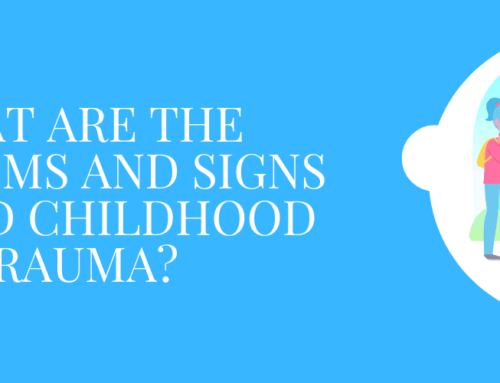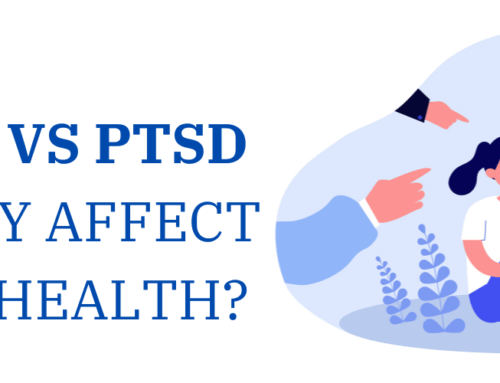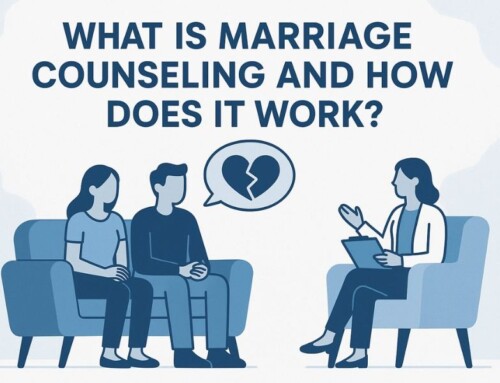Can Anxiety Cause Chest Pain? Here’s The Truth
TL;DR
|
|---|
It hits out of nowhere, tightness in your chest, a racing heart, and a wave of fear that something’s seriously wrong. You might even end up in the ER, only to hear, “Your heart looks fine.”
You’re not imagining things. Anxiety can absolutely cause chest pain, and it’s more common than most people realize. In fact, according to studies, 21% to 58% of patients with non-cardiac chest pain actually meet the criteria for a diagnosable anxiety disorder.
That means nearly half of those who think they might be having a heart attack are experiencing the intense physical effects of stress.
At Total Life Counseling, we see this all the time. Anxiety can show up in the body long before we recognize it in our minds. And when it targets the chest, it can feel terrifying but manageable once you understand what’s happening.
In this blog, we’ll help you break down the difference between anxiety chest pain and something more serious, and share ways to manage the symptoms with tools that actually work.
Because help and healing are within reach.
Can Anxiety Cause Chest Pain?
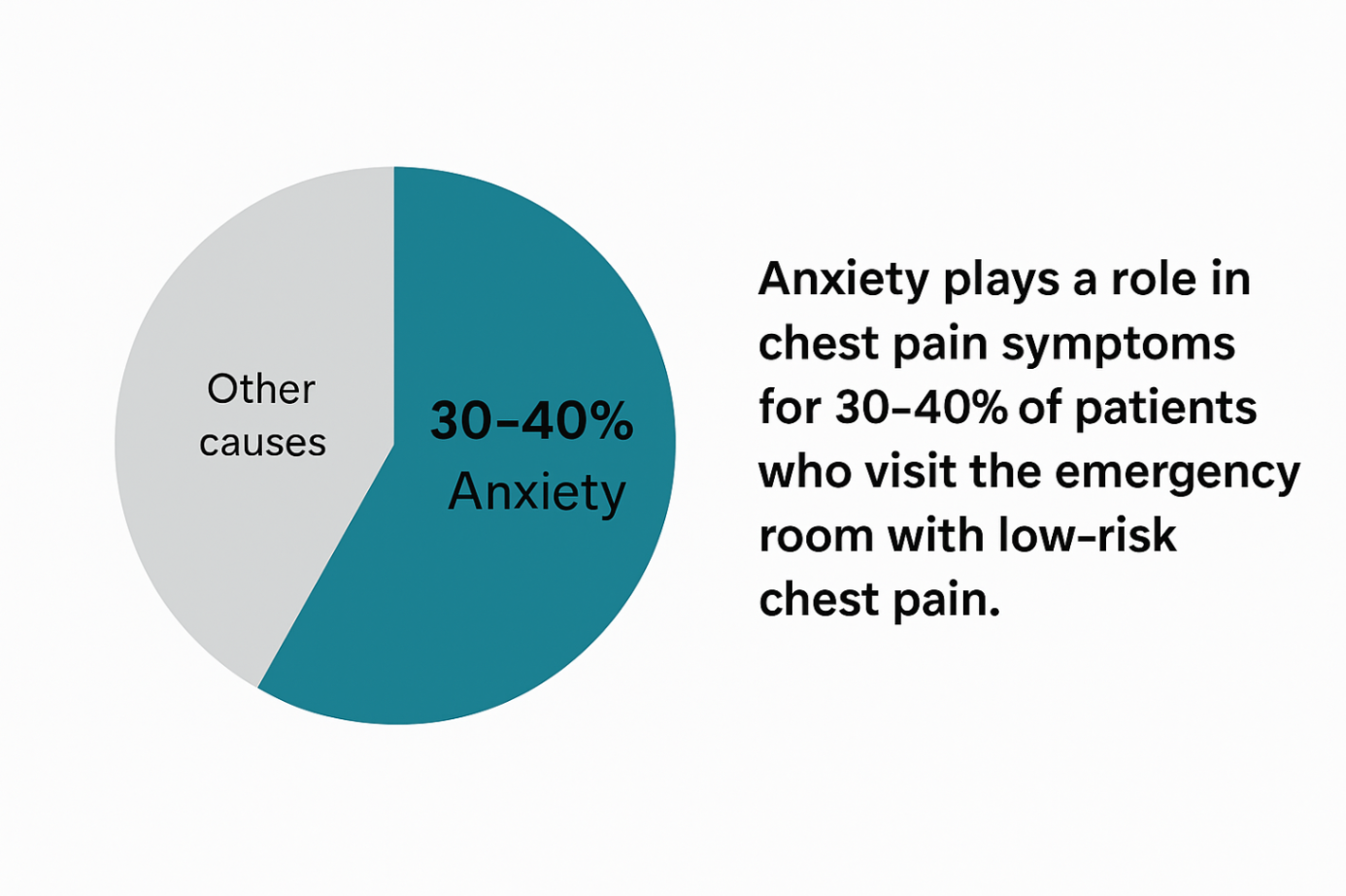
Yes, and it’s more common than you might think. In fact, as per studies, anxiety plays a role in chest pain symptoms for 30-40% of patients who visit the emergency room with low-risk chest pain.
Anxiety can cause physical symptoms that feel alarmingly real, and chest pain is one of the most distressing among them. When your body senses stress, it releases hormones like adrenaline and cortisol. These chemicals speed up your heart rate, tighten your muscles, and disrupt your breathing. All of this puts pressure on your chest, and that pressure can turn into sharp pain, tightness, or discomfort.
You might feel a sudden jolt during a stressful moment or a lingering ache after a panic attack. Either way, it’s your nervous system responding to what it perceives as a threat. The good news? It’s manageable once you understand the cause and get the right support.
How Does Anxiety Trigger Chest Pain?
When anxiety takes over, your body doesn’t just react emotionally, it responds physically. One of the most intense and confusing symptoms? Chest pain.
It all starts with your brain interpreting a situation as a threat, even if it’s not. This activates your body’s fight-or-flight response, flooding your system with a surge of adrenaline and cortisol. These chemicals cause increased heart rate, tighten muscles, and raise your blood pressure, all within moments.
Because the chest contains vital organs and is highly sensitive to stress-related tension, even slight changes in breathing or muscle engagement can lead to pain, tightness, or pressure. Shallow breathing, rapid heartbeat, or clenched chest muscles can make the sensation feel sharp or even alarming, often mistaken for something more serious.
How Does Anxiety Trigger Physical Symptoms Throughout The Body?
The chest isn’t the only area anxiety affects. In fact, when your body stays in stress mode for too long, almost every major system can respond with physical symptoms.
Here’s what that can look like:
- Chest: Tightness or pain due to muscle tension and shallow breathing
- Heart: Racing heartbeat or fluttering from adrenaline surges
- Lungs: Shortness of breath or air hunger
- Stomach: Nausea, cramping, or digestive upset caused by gut-brain disruption
- Muscles: Soreness or stiffness, especially in the neck, shoulders, and back
- Skin: Sweating, chills, or tingling from nerve responses
- Head: Dizziness, lightheadedness, or headaches from altered blood flow
These physical signs often come on suddenly and can feel overwhelming. And because they mimic symptoms of other medical issues, it’s easy to assume something’s seriously wrong, feeding even more anxiety into the cycle.
But recognizing that anxiety is the root cause can help break that loop. When you understand how your mind and body are connected, you can begin using tools like play therapy, breathing techniques, or guided relaxation to calm the system and reduce the intensity of symptoms over time.
What Does Chest Pain From Anxiety Feel Like?
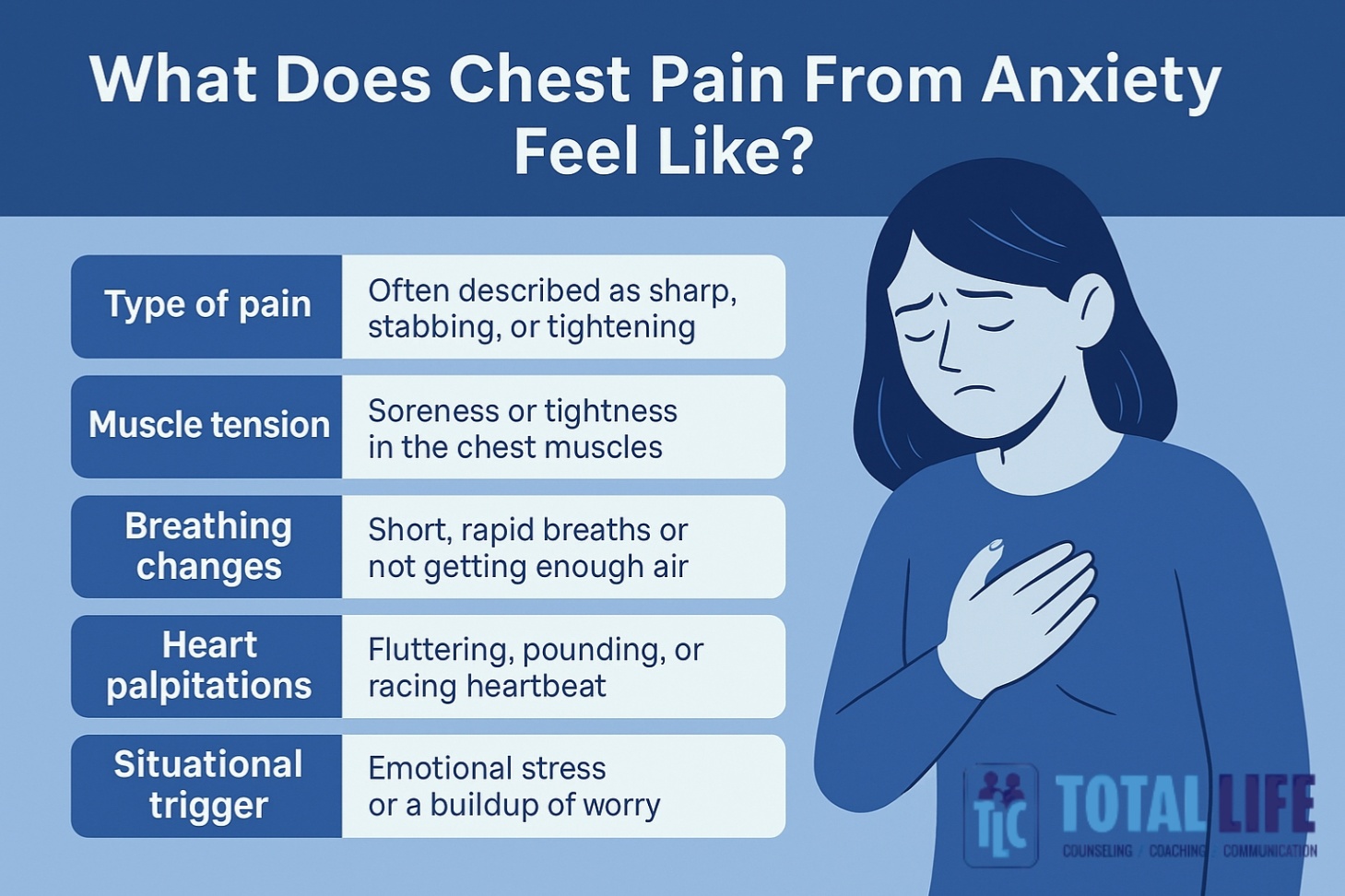
Anxiety-related chest pain can feel sharp, tight, stabbing, or even like a sudden jolt in the chest area. It might come on during a panic attack or slowly build during a stressful moment. What makes it especially confusing is how real and intense it feels, often leading people to fear the worst.
While anxiety symptoms such as chest pain can be frightening, there are a few signs that help separate them from heart-related causes:
- Type of pain: Often described as sharp, stabbing, or a tightening sensation. It may also feel like a quick spasm or pressure.
- Muscle tension: Anxiety often causes soreness or tightness in the chest muscles, especially if you’ve been shallow-breathing.
- Breathing changes: Accompanied by short, rapid breaths or a feeling of not getting enough air.
- Heart palpitations: A fluttering, pounding, or racing heartbeat may occur with the pain.
- Situational trigger: Frequently follows emotional stress, conflict, or a buildup of worry, not physical exertion.
These features often point to anxiety as the source, particularly when there’s no underlying heart condition.
How Does Duration And Intensity Compare To Other Chest Pains?
Anxiety chest pain is usually short-lived, lasting anywhere from a few seconds to several minutes. It tends to come and go, and often subsides with relaxation or grounding techniques.
By contrast, heart-related pain is often more persistent, can worsen with activity, and may radiate to the jaw, arm, or back. It usually feels heavy, squeezing, or crushing, rather than sharp or fluttery.
Also, anxiety chest pain may change in intensity throughout the day, while cardiac pain often remains steady or escalates.
Understanding these differences can help you better assess what you’re experiencing and take the right next steps for your health.
How Can You Tell if Chest Pain Is from Anxiety Or A Heart Attack?
|
Category |
Anxiety Chest Pain |
Heart Attack Pain |
|---|---|---|
| Onset | Suddenly, often during stress or panic | Sudden or gradual, it may occur at rest or during physical exertion |
| Pain Type | Sharp, stabbing, tight, or fleeting | Pressure, squeezing, heaviness, or crushing |
| Location | Center or left side of chest; may shift or feel superficial | Center or left chest; radiates to arm, jaw, neck, or back |
| Duration | Typically short-lived (minutes); may come and go | Usually lasts longer; persistent and steady |
| Triggers | Emotional stress, anxiety, panic attacks | Physical exertion, blocked artery, or underlying heart condition |
| Relief | Improves with deep breathing, rest, or calming techniques | Doesn’t ease with rest or breathing; may worsen over time |
| Other Symptoms | Heart palpitations, dizziness, shortness of breath, muscle tension | Nausea, cold sweats, shortness of breath, fatigue, lightheadedness |
| Response | Often manageable with therapy or stress reduction techniques | Requires immediate medical attention |
If there’s any doubt, always seek medical care. It’s better to rule out heart issues early than wait.
What Are Some Self-Help Techniques For Anxiety Chest Pain?
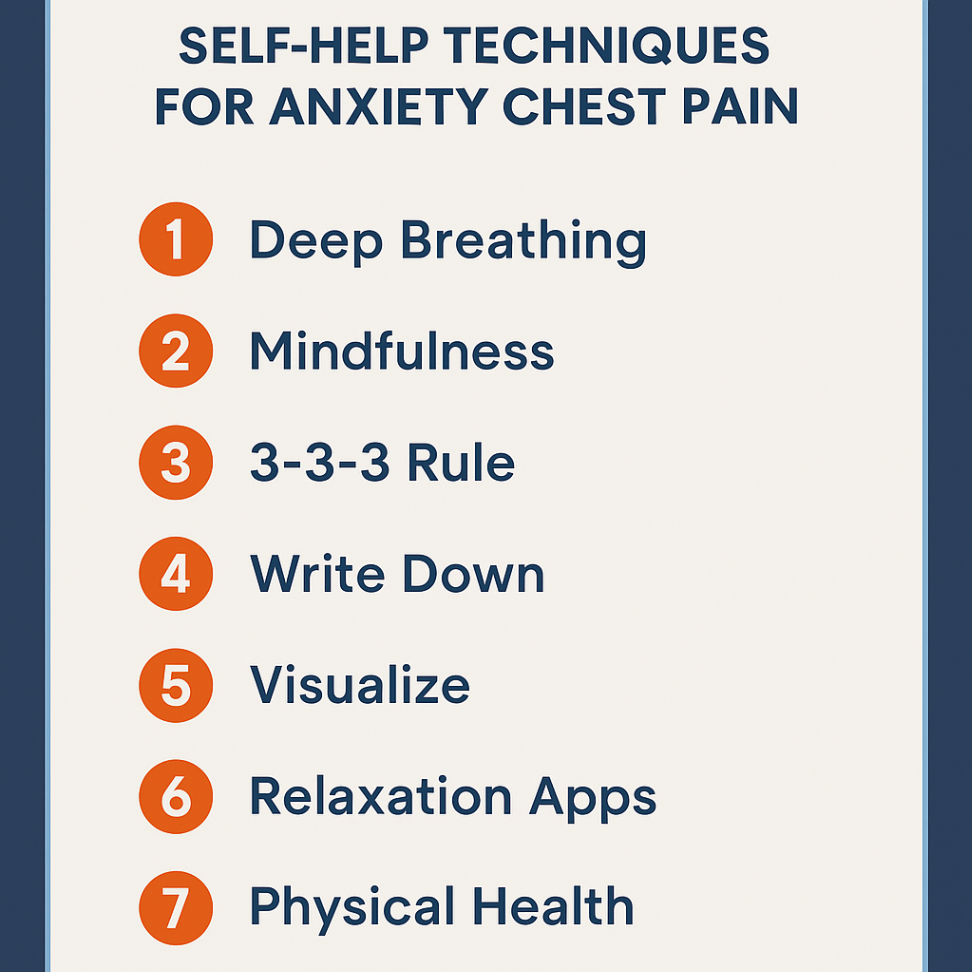
When anxiety hits your chest, it can feel scary and overwhelming. But there are simple, proven ways to calm your body from anxiety and take back control right from where you are.
Here are some techniques you can try anytime anxiety chest pain starts to build.
1. Can Deep Breathing Really Help?
Yes, and it’s one of the fastest ways to calm your nervous system.
When you breathe deeply and slowly, your body gets the message that it’s safe. This lowers your heart rate, reduces tension in your chest muscles, and helps your mind settle.
Try this:
- Inhale through your nose for 4 seconds.
- Hold your breath for 4 seconds.
- Exhale slowly through your mouth for 6 seconds.
- Repeat for 1–2 minutes
As you breathe, picture a calming scene, like waves rolling onto a quiet beach. It helps shift your focus away from the pain and toward relief.
2. How Does Mindfulness Ease Chest Pain?
Mindfulness brings you back to the present, where anxiety has less power.
When you’re mindful, you’re noticing your thoughts and sensations without trying to fight them. That simple shift can quiet racing thoughts and ease physical symptoms, including chest pain.
Even just pausing to notice your breath, your surroundings, or the feel of your feet on the floor can ground you in the moment.
3. Should I Try The 3-3-3 Rule?
Absolutely, it’s a quick and effective way to get out of your head and into your body.
Here’s how it works:
- Look around and name 3 things you can see
- Listen for 3 sounds you can hear.
- Move or touch 3 parts of your body (wiggle your fingers, shift your feet, roll your shoulders)
This helps interrupt spiraling thoughts and gives your brain something simple to focus on. It’s especially helpful during a panic surge.
4. What If I Can’t Think Clearly When It Happens?
Start by taking stock of what’s going on.
Ask yourself:
- Has this kind of chest pain happened before?
- Am I under stress right now?
- Is this pain changing with deep breathing or movement?
Writing down or simply noticing these things can help you respond more calmly and explain your symptoms better when speaking with a doctor.
5. Can Visualizing Something Peaceful Really Work?
Yes, it can redirect your brain away from panic.
If your chest feels tight and your thoughts are racing, close your eyes and picture a calm place. Maybe it’s the ocean, a quiet forest, or sitting safely at home.
Your body starts to follow where your mind goes. Visualization can slow your breathing, relax tight muscles, and ease the heaviness in your chest.
6. Are Relaxation Apps Actually Useful?
They can be surprisingly effective, especially if you use them regularly.
Most apps offer guided breathing, meditations, or calming music. Having something to press “play” on when you feel overwhelmed can make a big difference. Over time, these tools build your resilience and reduce the frequency of anxiety-related symptoms.
Some apps even let you track your mood or teach CBT techniques, a bonus support right in your pocket.
7. What Role Does Physical Health Play?
A big one.
Moving your body, eating balanced meals, staying hydrated, and getting enough rest all affect how your body handles stress. Regular activity helps release tension, stabilize your mood, and make anxiety easier to manage.
You don’t have to overhaul your lifestyle overnight. Even small changes, like a daily walk or drinking more water, can help reduce chest pain linked to anxiety.
Struggling with anxiety and chest pain?
Start getting relief today with expert support from Total Life Counseling Tampa.
When Should You Get Medical Help For Chest Pain?
If you’re feeling chest pain and you’re not sure what’s causing it, don’t wait it out.
Pain that’s intense, unfamiliar, or comes with other symptoms should always be taken seriously.
Even if you suspect anxiety, it’s important to rule out anything heart-related first. Better to be safe and reassured than to miss something that needs urgent care.
Call emergency services or go to the ER if you experience:
- Chest pain that doesn’t go away
- Pain that spreads to your arm, jaw, neck, or back
- Shortness of breath, especially if it gets worse
- Dizziness, nausea, or cold sweats
- A sudden spike in heart rate that doesn’t ease
These can be signs of a heart attack or another serious condition. If something feels off, don’t try to tough it out and get checked.
How Can I Tell If My Chest Pain Is Caused By Anxiety Or Something Serious?
That’s completely understandable. Anxiety and heart issues can feel very similar.
Here’s what to do:
- Pause and assess – Take a few deep breaths. Has this happened before? Did it follow a stressful moment?
- Note what you’re feeling – Is the pain moving? Is it sharp or heavy? Are you lightheaded or nauseous?
- Seek care if in doubt – If symptoms persist or intensify, go to the nearest emergency room. Healthcare providers can check your vitals, run tests, and give you peace of mind.
Even if it turns out to be anxiety, you’ve done the right thing. And once more serious causes are ruled out, you can begin working on managing anxiety with the right support.
Struggling With Anxiety Chest Pain? TLC Is There For You
That tightness in your chest, the racing heart, the sense of panic, it’s not just in your head. Anxiety can cause real physical symptoms that disrupt your day. At Total Life Counseling, we specialize in treating anxiety and stress-related conditions through flexible online therapy, so you can get support without leaving home.
Using evidence-based approaches, we help you understand your body’s stress response and teach you how to ease symptoms like chest pain, shortness of breath, and racing thoughts.
Treatment Options We Offer:
- Cognitive Behavioral Therapy (CBT)
- EMDR (Eye Movement Desensitization and Reprocessing)
- EFT (Emotional Freedom Techniques)
- DBT (Dialectical Behavior Therapy)
- Mindfulness & Relaxation Techniques
- Supplement and Wellness Support
Ready To Feel Like Yourself Again? Book your free 15-minute consultation today.
You Deserve Answers…. And Relief
Chest pain is scary, especially when you don’t know what’s causing it. But if anxiety is behind it, understanding that connection is a powerful first step. You’re not overreacting, and you’re not alone. Your body is simply responding to stress in a very real way.
With the right tools, support, and guidance, these symptoms can become easier to manage. And if something doesn’t feel right, it’s always okay to get it checked out. At Total Life Counseling in Tampa, we’re here to help you figure out what’s going on and walk with you toward feeling better, one breath at a time.
Frequently Asked Questions
What should I do if my anxiety chest pain won’t go away?
If your chest pain from anxiety keeps going, try to stay calm. Take some deep breaths to help yourself relax. Look at how you are feeling and see if anything is getting worse. If the chest pain becomes stronger or if you notice other symptoms, get medical help. It is important to put your well-being first. If you need help, do not wait to talk to someone.
How can I tell if my chest pain is caused by anxiety or something serious?
To figure out if your chest pain is from anxiety or something more serious, you need to consider the cause of your chest pain and look for other signs like shortness of breath, feeling dizzy, or pain that spreads. You should also think about the severity of the pain and how long it lasts. If the pain does not go away or gets worse, it may be time to see a doctor.
Are there natural remedies for anxiety-induced chest pain?
Some natural ways to help with chest pain caused by anxiety are drinking herbal teas like chamomile or lavender. Try to do regular physical activity, and eat a balanced diet. You can also use yoga and acupuncture to help you relax and bring down stress. But before you try these new things, you should talk to a healthcare professional.
When should I call 911 for chest pain?
If you have chest pain that starts suddenly or is very bad, get help right away. You should call 911 if you notice other signs like shortness of breath, sweating, or feeling dizzy. These could be signs of a heart attack or another serious problem that needs fast medical attention. Always trust what your body tells you in these moments.
Can anxiety cause chest pain every day?
Yes, you can have chest pain from anxiety daily. The causes of chest pain can be there all day or come and go. It often happens because of muscle tension in the chest. You might also notice that you feel pain more strongly when you are anxious. This can make the chest pain seem worse than it is. It is important to know if the pain is just from anxiety or if there could be another, more serious reason for it.
Is chest pain a couple of days after an anxiety attack normal?
Yes, you can still feel chest pain a few days after an anxiety attack. This is because stress and tension can stay with people after the event. But if the chest pain does not go away or gets worse, it is important to talk to a healthcare professional. They can help you find out if something more serious is happening.
Filed in: Anxiety, Gemima McMahon
Share This Story, Choose Your Platform!
Total Life Counseling Center consists of Licensed Counselors, masters level therapists, Español counselors, Licensed Mental Health Counselors, business coaches, and image enhancement coaches who provide counseling for emotional, mental, physical and spiritual care including marriage, individual, family, substance abuse and more. TLC’s family, trauma and marriage experts have been interviewed on National and Local TV/Radio over 200 times for their expert advice on Fox News, OWN, WETV, ABC’s Medical Minute and more. Our skilled counselors are relational, approachable and specialists providing therapy services in the Central Florida area including: Orlando, Winter Park, MetroWest, Windermere, Dr. Phillips, East Orlando, Lake Mary, and Clermont, Boca Raton Florida, and Dallas, TX.




